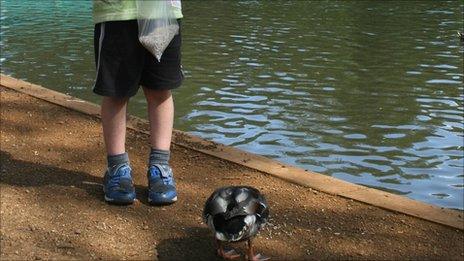Feeding ducks bread: Viral sign sparks anger and confusion
- Published
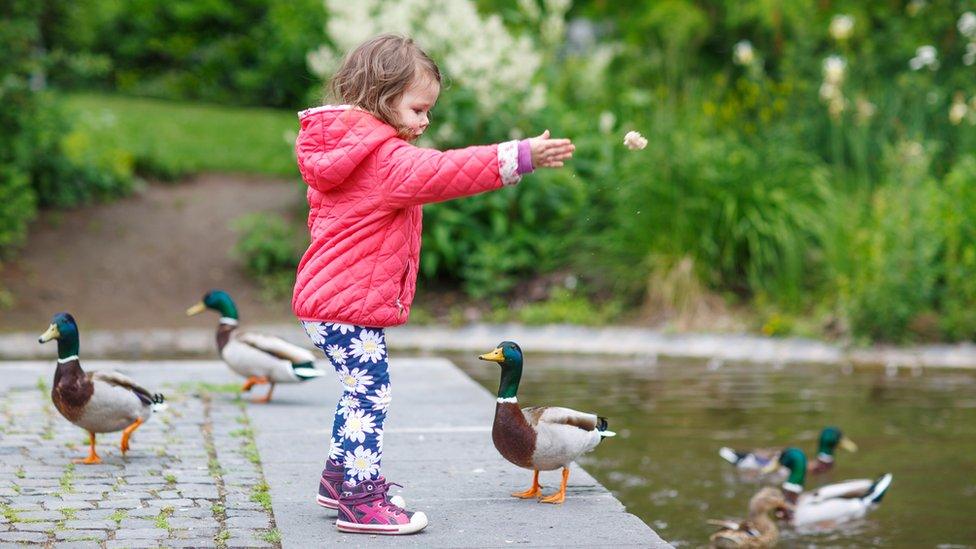
Does feeding bread to ducks help them or harm them?
A mysterious sign encouraging people to feed bread to "starving" ducks has stirred up confusion and angry debate about whether or not it is harmful.
The official-looking sign appeared in the Pavilion Gardens in Buxton, Derbyshire, but the park's managers insisted they were not responsible.
A mother who put a photo of the sign on Facebook was inundated with messages demanding she remove her post.
She has since deleted it, after the post was shared more than 17,000 times.
"I honestly thought I was doing a good deed," said Louisa Taylor.
"I have two young children so I really don't need the stress of it all."
The BBC asked various experts and they disagreed with each other too.
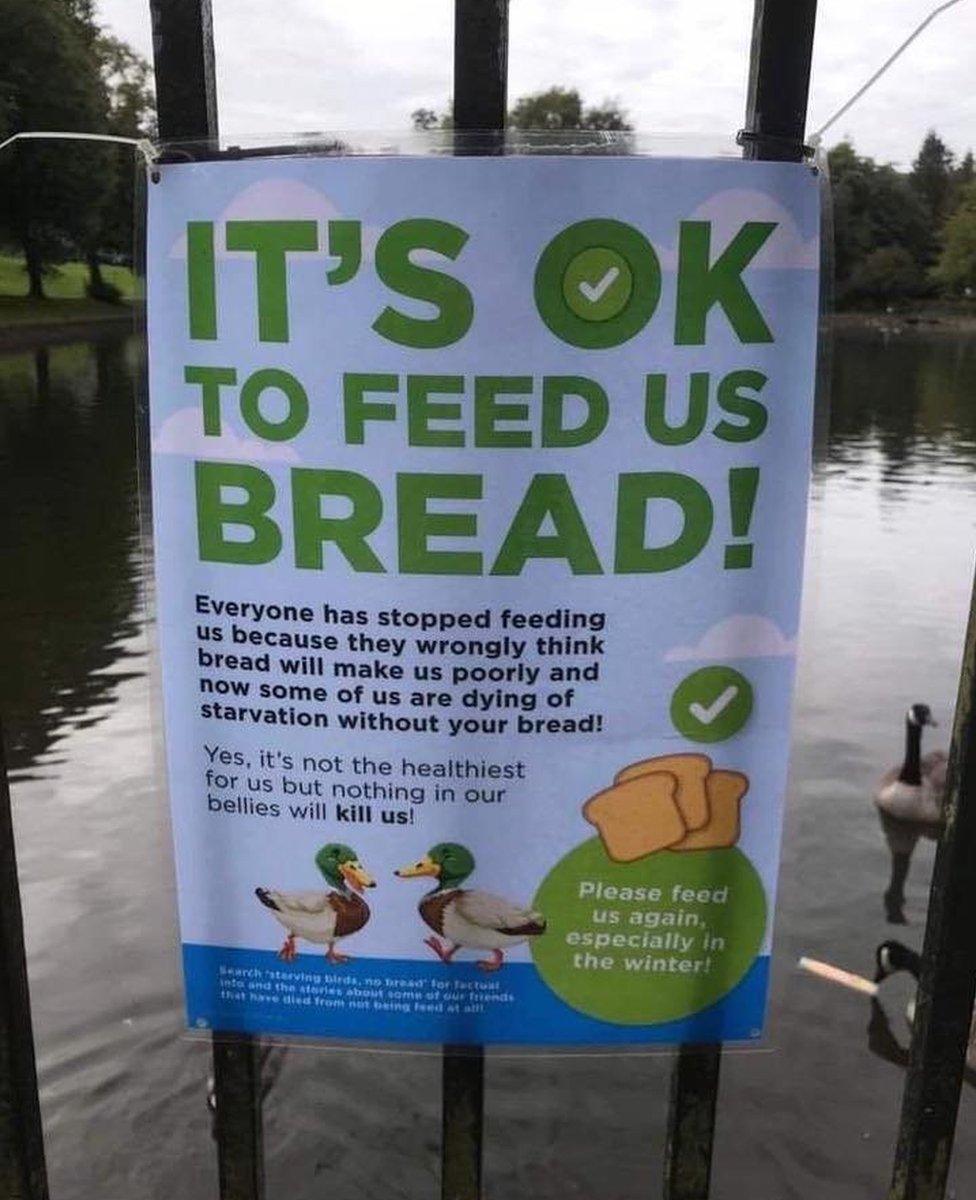
The sign appeared in Pavilion Gardens in Buxton, Derbyshire, but has since been removed
The photo - which was taken by one of Ms Taylor's friends - has appeared in thousands of Facebook timelines after being posted on multiple "Spotted" pages.
One commenter said: "How do people in this day and age still find it so difficult to do something as simple as feed ducks something other than bread!"
Another said: "Generations of people have fed ducks stale bread for years!! I see no decline in the duck population, just bloody feed them."
One woman said she and her husband were publicly told off by a stranger for feeding bread to ducks.
The photo has also been posted on Reddit, external with the title "I'm confused about duck diet now", and has had more than 39,000 upvotes.
'Quite confusing'
The woman who originally took the photo did not want to be named in this story because she feared a backlash for spreading incorrect information.
"There had been signs up the year before saying you can't feed bread to the ducks anymore, but then this sign was saying the ducks were dying and starving and I thought 'oh dear'," she said.
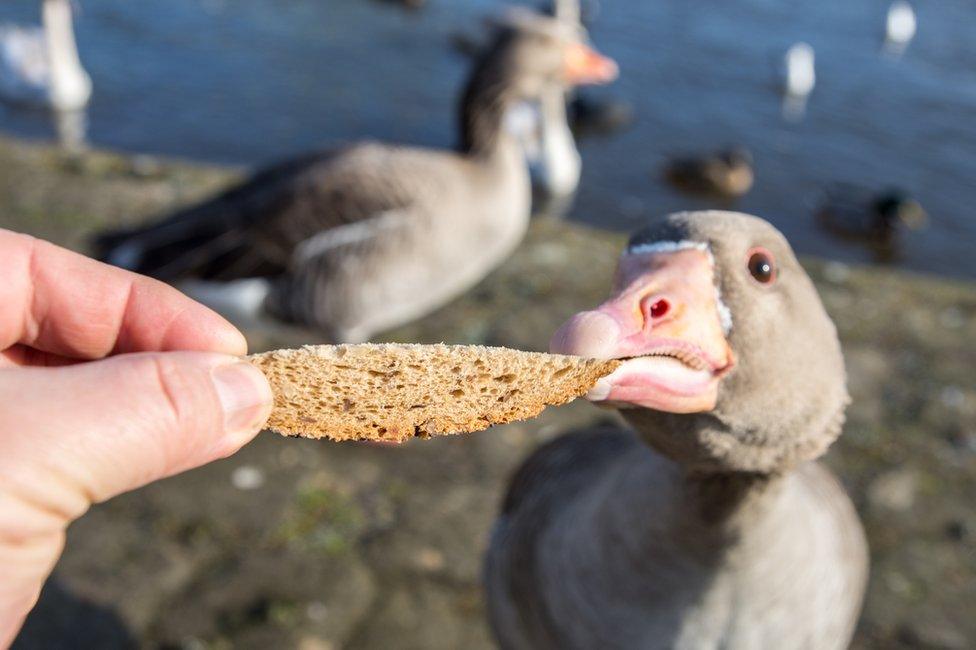
The RSPB said it was fine to feed water birds small amounts of bread
"I've got no idea who's put it up. It was only up for a few days and I haven't seen it since.
"It's quite confusing. If the advice is wrong then I don't really want to be responsible for putting it out there."
What was the experts' advice?
'Bread isn't harmful'
The Royal Society for the Protection of Birds (RSPB) said it was fine to feed small amounts of bread to ducks but people should also feed them sweetcorn, porridge oats, peas and bird seed.
"Just like us, birds need a varied diet to stay healthy," said Tony Whitehead from the charity.
"Although ducks and swans can digest all types of bread, too much can leave them feeling full without giving them all of the important vitamins, minerals and nutrients they need.
"So, although bread isn't harmful, our advice is to only feed small amounts to birds."
'Excessive amounts of bird droppings'
Peter Birch: "Still too much bread is being dumped in the waterways"
The Canal and River Trust has campaigned against feeding bread to ducks, and has claimed it is "bad for ducks", external.
"Uneaten soggy bread can cause a build-up of bad nutrients which can lead to greater algal growth, spread disease and encourage pests such as rats," it said.
"It [feeding bread] also creates excessive amounts of bird droppings which, along with being smelly and slippery underfoot, can reduce water quality and clog waterways with harmful algae."
Ducks 'dying from starvation'
A Berkshire charity says that misinformation has confused the public.
Swan Support, which rescues swans, ducks and geese, said many were starving because people had stopped feeding them bread in recent years.
They blamed a campaign called Ban the Bread, which was started by a company selling bird food.
"They wanted people to buy their food and that's where it all started," said Wendy Hermon from Swan Support.
"We were picking them up dying everywhere."
She said flocks of birds had become established in certain areas because of people feeding them and they had become reliant on this food supply.
"It's absolutely fine to feed bread. Bread has been fed to swans, ducks and geese for hundreds of years," she said.
However, she said people should only throw in as much as the birds ate, so there was no excess bread left behind to decay.
'It won't do them a lot of good'
Wild duck food maker Quack Snacks said while a "small amount of bread is unlikely to do ducks harm, it won't do them a lot of good either".
"There are alternatives to bread that contain more nutrients for waterfowl," said founder Andrew Hemmings.
"As lots of people enjoy feeding the ducks it is hard to avoid them having too much bread, so it would be much better if people offered something more nutritious and only did so in small amounts."
'Moderation is hard to judge'
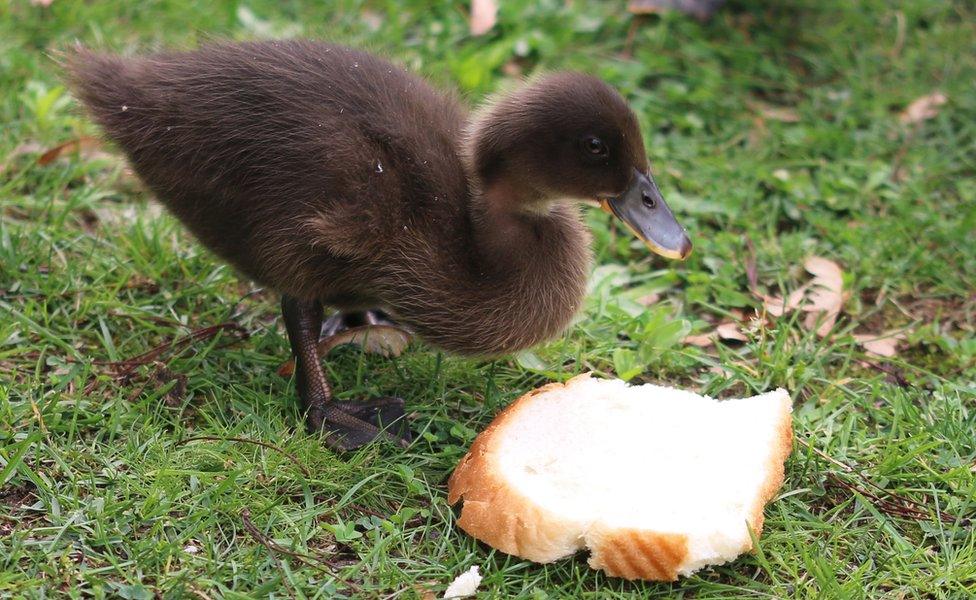
Young birds "need to learn to forage for plants and insects"
The Wildfowl and Wetlands Trust said bread was "fine for water birds as long as it only forms a small part of their diet".
"Moderation is especially important in the spring and summer when an unbalanced diet can cause developmental problems for growing young birds," said Peter Morris.
"But moderation is hard to judge when other well-meaning people may also be feeding bread to the same birds at other times."
He said feeding birds vegetables, wheat grain and specialist food was safer and healthier. Winter was the best time to feed water birds, he said, when natural vegetation would be in short supply.
"Additional food is less vital in spring and summer, when young birds need to learn to forage for plants and insects, for a balanced diet and good physical development," he said.

Do you have any information about the origin of the sign? Get in touch with us on Facebook, external, Twitter, external, or Instagram, external. Send your story ideas to eastmidsnews@bbc.co.uk, external.
- Published27 March 2016
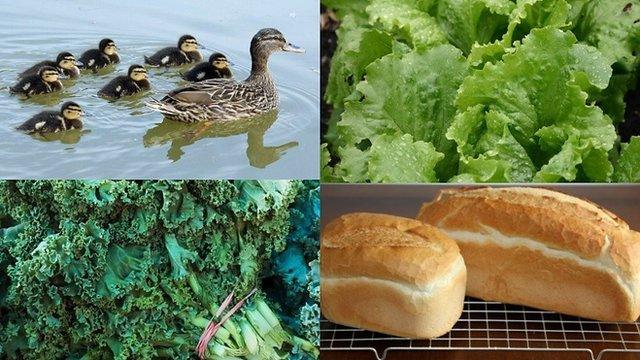
- Published14 March 2016
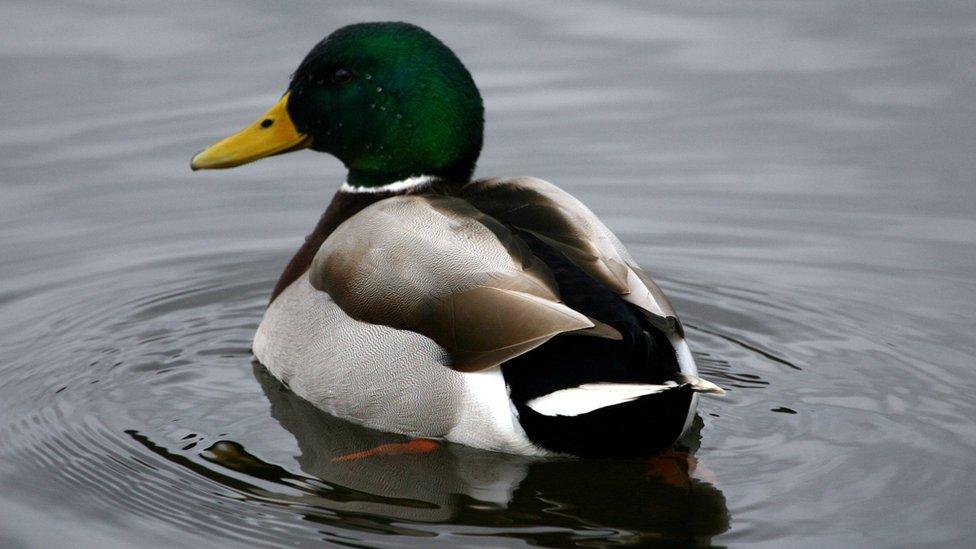
- Published16 March 2015
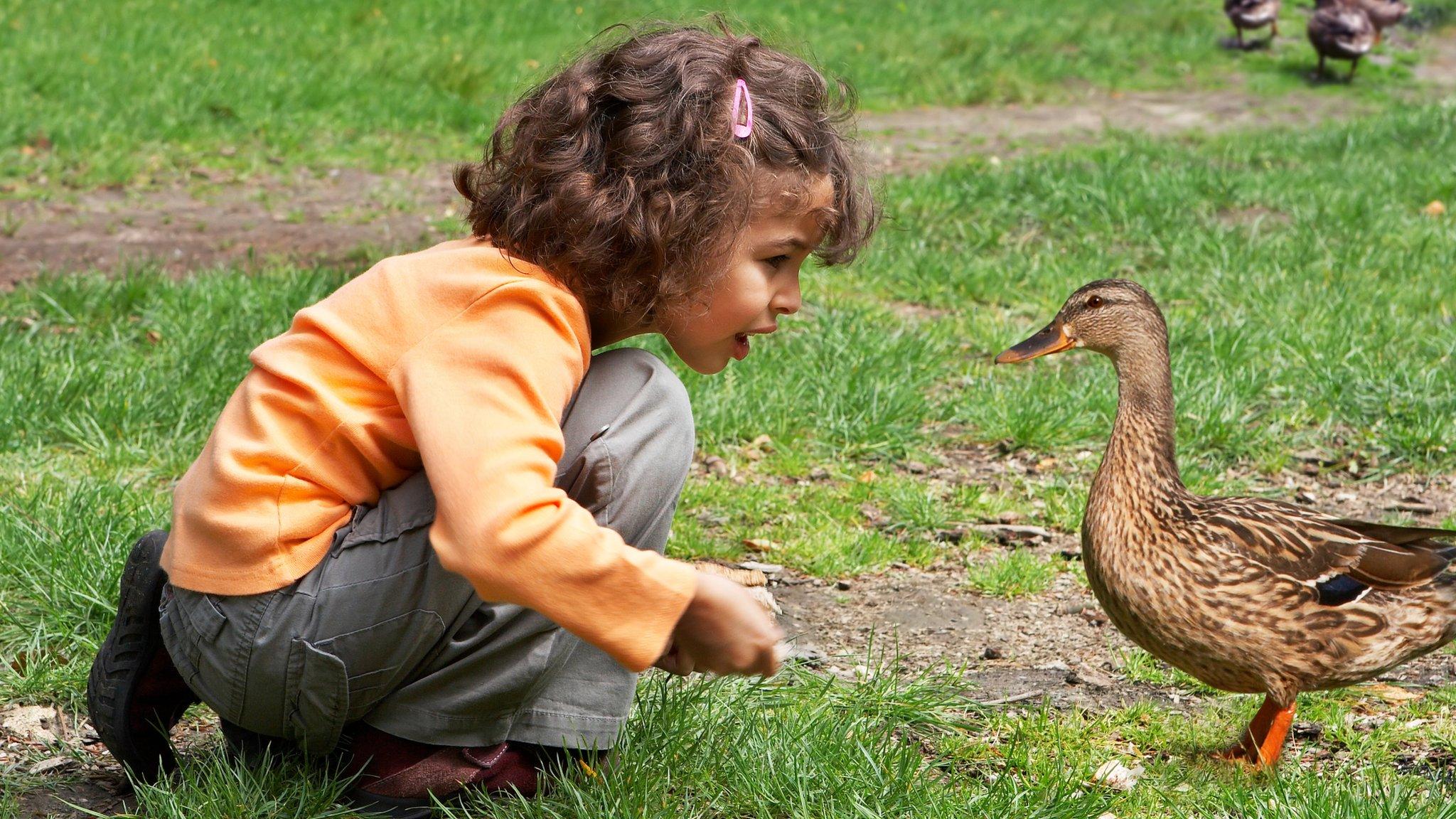
- Published12 August 2014
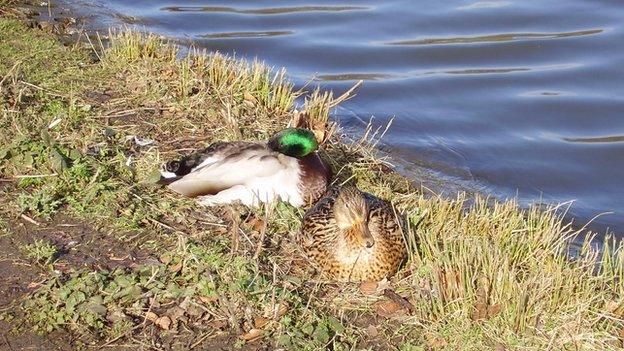
- Published25 July 2011
